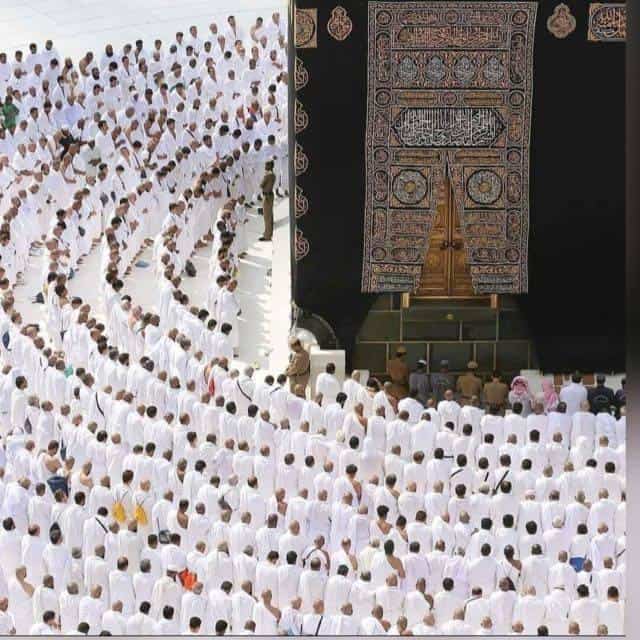Hajj Reflections 3 – Ikhlas and Taqwa

Makkah Al Mukarramah: The time and the place
Allah Almighty described the Ka’ba:
‘The first house established for mankind is the one at Bakka; blessed, and guidance for all people. (3:96)
The majesty of Makkah and sweetness of Madinah
The tranquility of the sacred place
In a verse, Allah Almighty describes the Haram in the following way:
‘And whoever enters into this house will have security and tranquillity descend on him’. (3:97)
You don’t feel this calmness and tranquillity in your heart anywhere else. You forget your family, time, and dunya. It is a different world. Blessings descend (showered with mercy) on those during tawaf, salah or even just gazing at the Ka’ba.
The peace and security of Hajj
The Hajj is during specific months. (2:197)
Why Rajab? Rajab is also classed as a prohibited month because it is the month of Umrah. So you can see the inside and outside security, tranquility Allah Almighty mentions His order for safety and security in the last two verses of Surah Quraish:
‘Let them worship the Lord of this House, Who has fed them from hunger and has secured them against fear,’ (106:3-4)
So He is counting the favours He bestowed upon them. These are blessings, so in gratitude He wants us to worship Him with full concentration.
Sincerity – the Key to Acceptance
Hajj is mentioned many times in the Qur’an. In Surah Baqarah and in Surah al-Imran and in Surah Al-Hajj. The verses contain very beautiful descriptions. They mention the story of Ibrahim (peace be on him) building the Ka’ba. Ibrahim and Ismail (peace be on him) started making dua which shows that their main concern was acceptance and that this was connected with Hajj, the history of Hajj and the House of Allah Almighty. Therefore they made the dua:
‘When Abraham and Ishmael were raising the foundations of the House, (Abraham prayed): Our Lord! Accept from us (this duty). Lo! You, only You, are the Hearer, the Knower’ (2:127)
This is because whatever we do, we must always consider whether it is acceptable to Allah Almighty or not.
In the saying (hadith) of the Prophet (peace be on him) said: ‘Actions are but by intentions.’ (Bukhari)
It is the intention behind the action that makes any deed acceptable or not. So the password for acceptance is sincerity or ikhlas. Ask yourself why are you doing this deed today? The purity of the intention is what makes a deed acceptable or not. Is it for Allah Almighty’s sake? If it is, this will make it acceptable.
Taqwa – the Best preparation
And purify your clothes. (74:4)
‘And prepare for your journey, And take provisions, but the best provision is taqwa righteousness. And be mindful of Me, O people of understanding. (2:197)
Preparation is a common aspect in other acts of worship too. Allah Almighty mentions preparation to draw our attention to the most important aspect – which is not luggage or other provisions for travelling – but the best provision is Taqwa, i.e. doing the obligations and refraining from prohibitions. So make preparation with taqwa – fear displeasing Allah Almighty and behave with piety, to be closer to Him in all that you do. Feel answerable to Him. The first and most important thing is taqwa.
Having taqwa is not an attitude exclusive to Hajj (you shouldn’t leave taqwa behind when you leave Makkah). The outcome of Hajj has to be an increase in taqwa. You find this in salah (prayer) and siyam (fasting) as well.
How do we increase our taqwa? Allah Almighty mentions the avoidance of three things during Hajj to increase our taqwa, i.e. control of:
There is no room for evil actions. Abstain from arguments, sexual talk and intercourse. If we avoid these we will have Hajj Mabroor (an accepted Hajj).
Whoever decides to perform the Hajj—there shall be no sexual relations, nor misconduct, nor quarrelling during the Hajj. And whatever good you do, God knows it. (2:197)
Shaykh Haytham Tamim – Tafseer Class 4th July 2022
- Connection and self-discovery
- Alone yet united
- Sincerity and obedience
- Transformation and tests
- Choosing between your will and Allah’s
- Waiting, being and having nothing
- Focus and forgiveness
- Emerging from humiliation
- Goodness from pain
- Have deep trust
Recommended Posts

The truth is more powerful than lies
July 26, 2024

Global IT outage. When systems go down…
July 19, 2024


